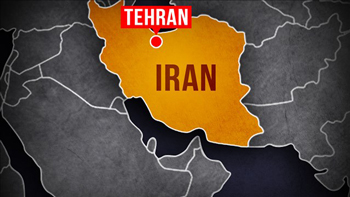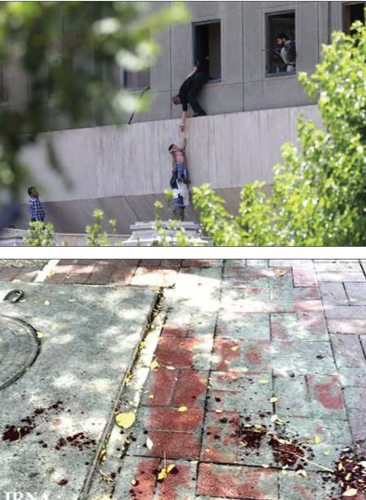Middle East madness and confusion
By Brian E. Muhammad -Contributing Writer- | Last updated: Jun 14, 2017 - 10:05:08 AMWhat's your opinion on this article?

The funeral ceremony for victims killed on June 7 twin terrorist attacks in the Iranian capital was held in the Iranian Parliament June 9. Photos: president.ir
|
Simultaneous gun attacks in Iran on June 7, killed at least 17 people and injured dozens. The gunmen targeted the Iranian parliament building and the Mausoleum of the late leader of the Islamic Revolution, Ayatollah Ruhollah Khomeini. The Islamic State (IS/ISIL/ISIS) terror group claimed responsibility for the assault. Iran has been involved in an international campaign to eradicate the group seen as a global menace. However, until now Iran has not been targeted directly by IS, said observers.
Iranian leaders accused the United States and Saudi Arabia of supporting the Islamic State. Saber rattling has intensified between the three countries recently. The Iranian people expressed their anger at the violence during a mass funeral in Tehran following Friday prayers. Thousands chanted “Down with the U.S.” and “Death to Al-Saud,” the Saudi royal family, while carrying coffins of victims, reported the Associated Press.

|
“Today is a hard day for the Iranian nation. Farewell to dear ones, who were sadly martyred,” said Parliament Speaker Ali Larijani. “The terrorists fell short of their [main] aim” and then started to blindly target civilians and employees,” he said.
In a condolence message for the victims, the country’s Supreme Leader, Ayatollah Ali Khamenei declared the assault: “will not damage the Iranian nation’s determination, and the obvious result is nothing except an increase in hate for the governments of the United States and their stooges in the region like Saudi (Arabia),” state media reported.
Iranian TV said June 9, the Intelligence Ministry announced 41 suspects were arrested in Tehran and the western Kurdish provinces of the country. The report described the detainees as “elements of the Wahhabi IS group,” and said they were involved in operations, communication and logistics for a local IS cell.
Iran’s Islamic Revolutionary Guard Corps (IRGC) said the timing of the attack was “significant,” coming days after U.S. President Donald Trump met with Saudi officials during his first presidential trip to the Middle East in late May.
In Riyadh, along with authorizing a $110 billion arms sale to the Saudis, Pres. Trump called on leaders of the Gulf Cooperation Council (GCC)—a regional group of Arab and Muslim nations—to unite against Iran to “isolate it” and “deny it.”
The move of Pres. Trump in the region is consistent with what the U.S. has always done in foreign lands, according to the Honorable Minister Louis Farrakhan, the National Representative of the Most Honorable Elijah Muhammad and the U.S.-based Nation of Islam.
“America doesn’t care about “democracy” if that democracy brings into power people that she does not want, that will not be amenable to her foreign-policy objectives and her national interest,” Minister Farrakhan said during a lecture series called “The Time and What Must Be Done.”
Because of such planning, based on war mongering, the CIA (Central Intelligence Agency), the NSA (National Security Agency) and the U.S. government would covertly engage in creating and exploiting differences that naturally exist within all nations, and fund these differences that would one day explode into possible civil war, fratricidal conflict, death and destruction, he said.
The Muslim leader referred to the strategy as the “mischief making” of a “Mischief Maker” and “Universal Blood Shedder.”

Death toll in Tehran attacks rises to 17. Photos: irna.ir
|
Analysts told The Final Call, that America selling arms to the Saudis will only aggravate tension, fuel existing conflicts and threaten more U.S. proxy wars.
“What are they going to do with those arms,” asked Jibril Hough, activist and spokesperson for the Islamic Center of Charlotte. “More Muslims are going to die,” he said.
The deal “balls down to gun talk…it’s gangsterism on the highest level,” Mr. Hough added. The outspoken critic of the Trump administration expects the deal will benefit some of the forces America says its fighting.
“The quid pro quo is that Saudi Arabia is being armed to essentially fight against the forces of resistance in the region,” said Dr. Kevin Barrett, author and editor of Veterans Today to The Final Call.
He said basically that means containing Iran, the main rival of the Saudis for regional hegemony and influence.
Saudi-U.S. relations were strained during the Barack Obama administration which attempted to softened hostilities with Iran. Pres. Trump’s visit rekindled the relationship and gave U.S. commitment to back its longtime ally and many of the Gulf nations in tow.
But currently the GCC (Gulf Cooperation Council) is in a diplomatic crisis against itself. There is a deep division manifested by the sudden rejection and isolation of Qatar by members led primarily by Saudi Arabia, Egypt, the United Arab Emirates and Bahrain. Several other nations signed on later.
The small but wealthy nation is accused of funding both “Sunni Islamist militants” and leaning favorably toward “Shi’ite Muslim” Iran— charges Qatar rejects.
“Washington relies closely on the countries on both sides of the dispute for its military operations in the Gulf: Qatar hosts the U.S. Air Force’s biggest base in the region, while Bahrain hosts the U.S. Navy,” said a June 9 Reuters story.
The gulf rift has also highlighted more public confusion of the Trump administration. Initially Pres. Trump tweeted his strong agreement with the moves against Qatar, while his Secretary of State Rex Tillerson and Secretary of Defense Jim Mattis sought to remain neutral.
Critics maintain the position is the proverbial ‘pot calling the kettle, metal’ because both Saudi Arabia and Qatar have funded rebels fighting in Syria and other global hotspots. If the rift is about the principled line of fighting terror, then there is a credibility problem if led by the Saudis and applauded by the Americans.
While in Saudi Arabia, before the member states of the GCC, Pres. Trump and Saudi King Salman inaugurated the Global Center for Combating Extremist Ideology on May 21. The center’s twitter account said its aim is to spread and promote peace and confront and refute extremism to make a safer world.
The idea sounds noble, but observers says it’s hypocritical.
At the time, “Trump and his Saudi hosts mouthed slogans about stopping the spread of evil extremism and Trump basically equated it with Islam, which didn’t seem to bother the Saudis too much,” Dr. Barrett said.
“This is all the most grotesquely, hypocritical big lie that could ever be imagined,” he added.
Because, “it’s in fact, the United States, Saudi Arabia and their masters in Tel Aviv who have essentially created the whole phenomenon of extremist Wahabi, Takfiri so-called terrorism,” argued Dr. Barrett.
INSIDE STORIES AND REVIEWS
-
-
About Harriett ... and the Negro Hollywood Road Show
By Rabiah Muhammad, Guest Columnist » Full Story -
Skepticism greets Jay-Z, NFL talk of inspiring change
By Bryan 18X Crawford and Richard B. Muhammad The Final Call Newspaper @TheFinalCall » Full Story -
The painful problem of Black girls and suicide
By Charlene Muhammad -National Correspondent- » Full Story -
Exploitation of Innocence - Report: Perceptions, policies hurting Black girls
By Charlene Muhammad -National Correspondent- » Full Story -
Big Ballin: Big ideas fuel a father’s Big Baller Brand and brash business sense
By Bryan Crawford -Contributing Writer- » Full Story






 Click Here Stay Connected!
Click Here Stay Connected!








